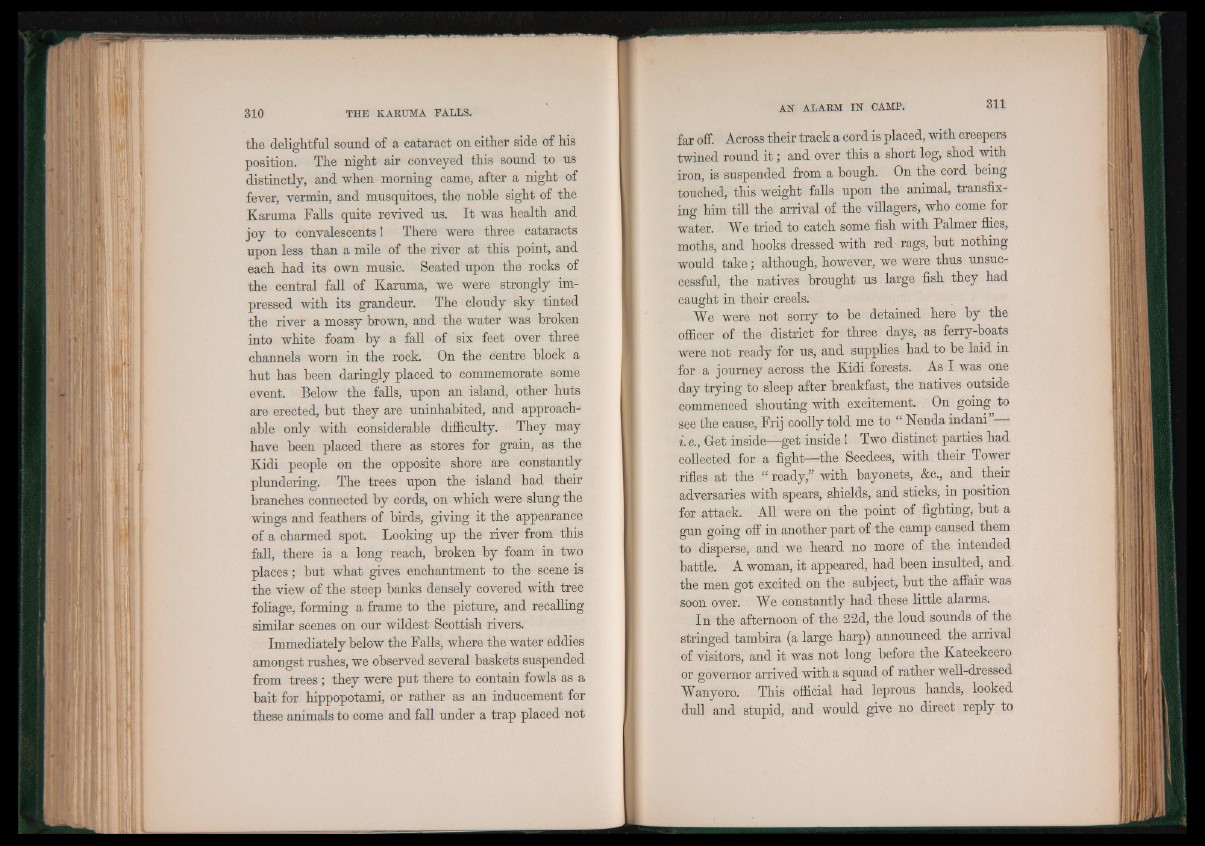
the delightful sound of a cataract on either side of his
position. The night air conveyed this sound to us
distinctly, and when morning came, after a night of
fever, vermin, and musquitoes, the nohle sight of the
Karuma Falls quite revived us. It was health and
joy to convalescents! There were three cataracts
upon less than a mile of the river at this point, and
each had its own music. Seated upon the rocks of
the central fall of Karuma, we were strongly impressed
with its grandeur. The cloudy sky tinted
the river a mossy brown, and the water was broken
into white foam by a fall of six feet over three
channels worn in the rock. On the centre block a
hut has been daringly placed to commemorate some
event. Below the falls, upon an island, other huts
are erected, but they are uninhabited, and approachable
only with considerable difficulty. They may
have been placed there as stores for grain, as the
Kidi people on the opposite shore are constantly
plundering. The trees upon the island had their
branches connected by cords, on which were slung the
wings and feathers of birds, giving it the appearance
of a charmed spot. Looking up the river from this
fall, there is a long reach, broken by foam in two
places; but what gives enchantment to the scene is
the view of the steep banks densely covered with tree
foliage, forming a frame to the picture, and recalling
similar scenes on our wildest Scottish rivers.
Immediately below the Falls, where the water eddies
amongst rushes, we observed several baskets suspended
from trees; they were put there to contain fowls as a
bait for hippopotami, or rather as an inducement for
these animals to come and fall under a trap placed not
far off. Across their track a cord is placed, with creepers
twined round i t ; and over this a short log, shod with
iron, is suspended from a bough. On the cord being
touched, this weight falls upon the animal, transfixing
bim till the arrival of the villagers, who come for
water. We tried to catch some fish with Palmer flies,
moths, and hooks dressed with red' rags, but nothing
would take; although, however, we were thus unsuccessful,
the natives brought us large fish they had
caught in their creels.
We were not sorry to be detained here by the
officer of the district for three days, as ferry-boats
were not ready for us, and supplies had to be laid in
for a journey across the Kidi forests. As I was one
day trying to sleep after breakfast, the natives outside
commenced shouting with excitement. On going to
see the cause, Frij coolly told me to “ Nenda indani
i. e., Get inside—get inside! Two distinct parties had
collected for a fight—the Seedees, with their Tower
rifles at the “ ready,” with bayonets, &c., and their
adversaries with spears, shields, and sticks, in position
for attack. All were on the point of fighting, but a
gun going off in another part of the camp caused them
to disperse, and we heard no more of the intended
battle. A woman, it appeared, had been insulted, and.
the men got excited on the subject, but the affair was
soon over. We constantly had these little alarms.
In the afternoon of the 22d, the loud sounds of the
stringed tambira (a large harp) announced the arrival
of visitors, and it was not long before the Kateekeero
or governor arrived with a squad of rather well-dressed
Wanyoro. This official had leprous hands, looked
dull and stupid, and would give no direct reply to